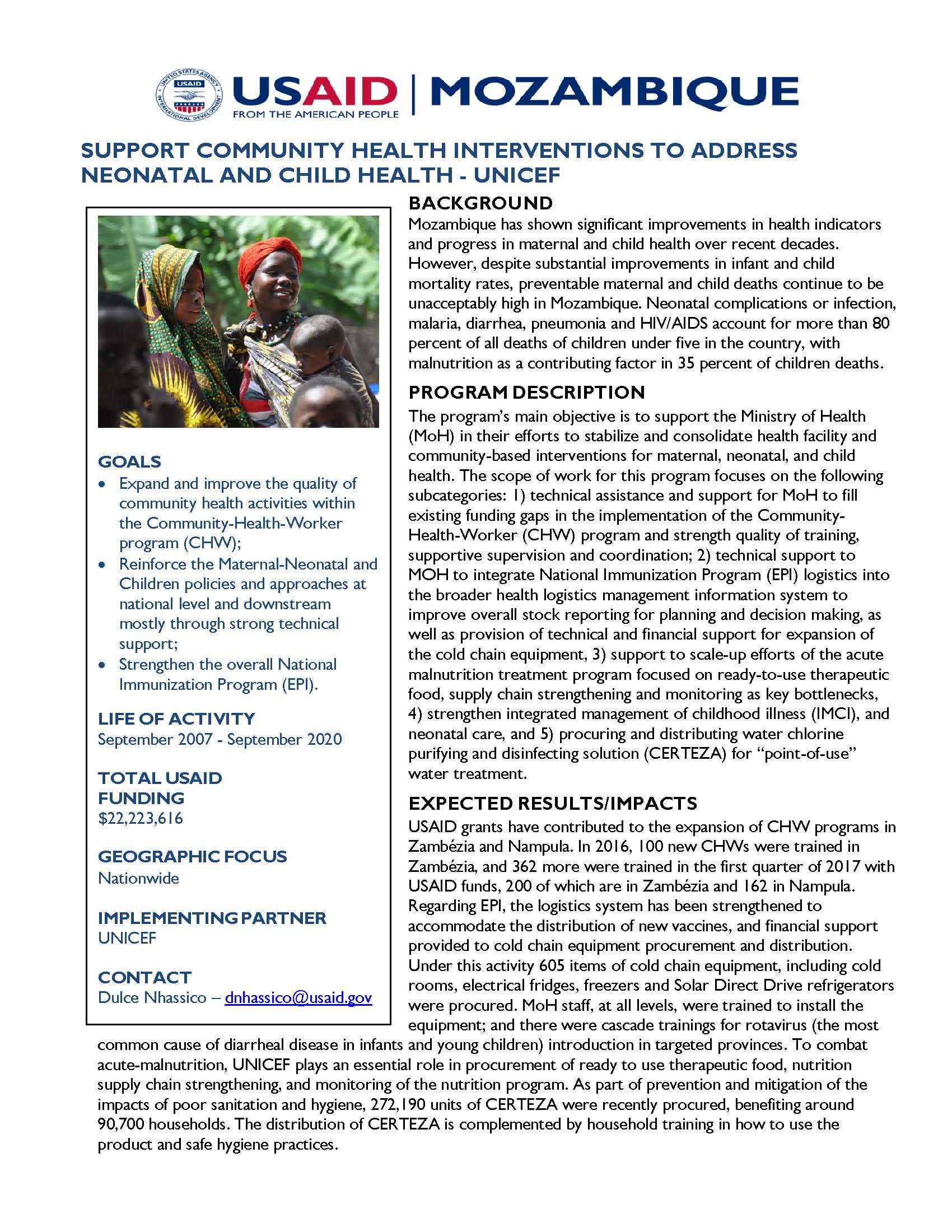Speeches Shim
![]() (148k) SUPPORT COMMUNITY HEALTH INTERVENTIONS TO ADDRESS NEONATAL AND CHILD HEALTH - UNICEF - Fact Sheet
(148k) SUPPORT COMMUNITY HEALTH INTERVENTIONS TO ADDRESS NEONATAL AND CHILD HEALTH - UNICEF - Fact Sheet
BACKGROUND
Mozambique has shown significant improvements in health indicators and progress in maternal and child health over recent decades. However, despite substantial improvements in infant and child mortality rates, preventable maternal and child deaths continue to be unacceptably high in Mozambique. Neonatal complications or infection, malaria, diarrhea, pneumonia and HIV/AIDS account for more than 80 percent of all deaths of children under five in the country, with malnutrition as a contributing factor in 35 percent of children deaths.
PROGRAM DESCRIPTION
The program’s main objective is to support the Ministry of Health (MoH) in their efforts to stabilize and consolidate health facility and community-based interventions for maternal, neonatal, and child health. The scope of work for this program focuses on the following subcategories: 1) technical assistance and support for MoH to fill existing funding gaps in the implementation of the Community-Health-Worker (CHW) program and strength quality of training, supportive supervision and coordination; 2) technical support to MOH to integrate National Immunization Program (EPI) logistics into the broader health logistics management information system to improve overall stock reporting for planning and decision making, as well as provision of technical and financial support for expansion of the cold chain equipment, 3) support to scale-up efforts of the acute malnutrition treatment program focused on ready-to-use therapeutic food, supply chain strengthening and monitoring as key bottlenecks, 4) strengthen integrated management of childhood illness (IMCI), and neonatal care, and 5) procuring and distributing water chlorine purifying and disinfecting solution (CERTEZA) for “point-of-use” water treatment.
EXPECTED RESULTS/IMPACTS
USAID grants have contributed to the expansion of CHW programs in Zambézia and Nampula. In 2016, 100 new CHWs were trained in Zambézia, and 362 more were trained in the first quarter of 2017 with USAID funds, 200 of which are in Zambézia and 162 in Nampula. Regarding EPI, the logistics system has been strengthened to accommodate the distribution of new vaccines, and financial support provided to cold chain equipment procurement and distribution. Under this activity 605 items of cold chain equipment, including cold rooms, electrical fridges, freezers and Solar Direct Drive refrigerators were procured. MoH staff, at all levels, were trained to install the equipment; and there were cascade trainings for rotavirus (the most common cause of diarrheal disease in infants and young children) introduction in targeted provinces. To combat acute-malnutrition, UNICEF plays an essential role in procurement of ready to use therapeutic food, nutrition supply chain strengthening, and monitoring of the nutrition program. As part of prevention and mitigation of the impacts of poor sanitation and hygiene, 272,190 units of CERTEZA were recently procured, benefiting around 90,700 households. The distribution of CERTEZA is complemented by household training in how to use the product and safe hygiene practices.


Comment
Make a general inquiry or suggest an improvement.